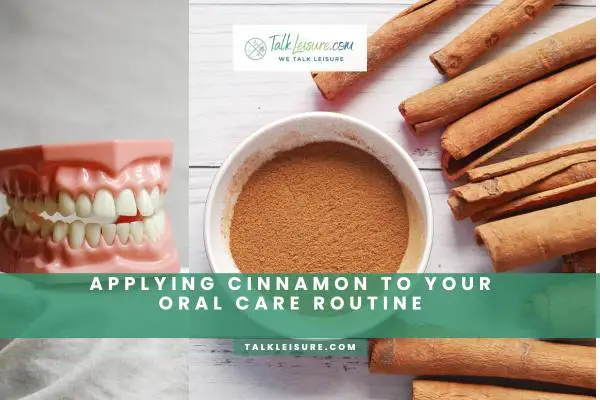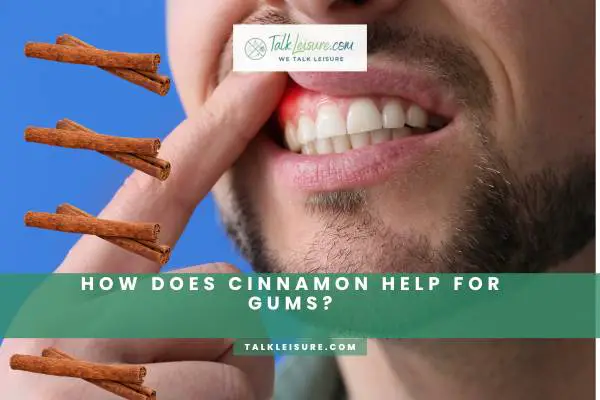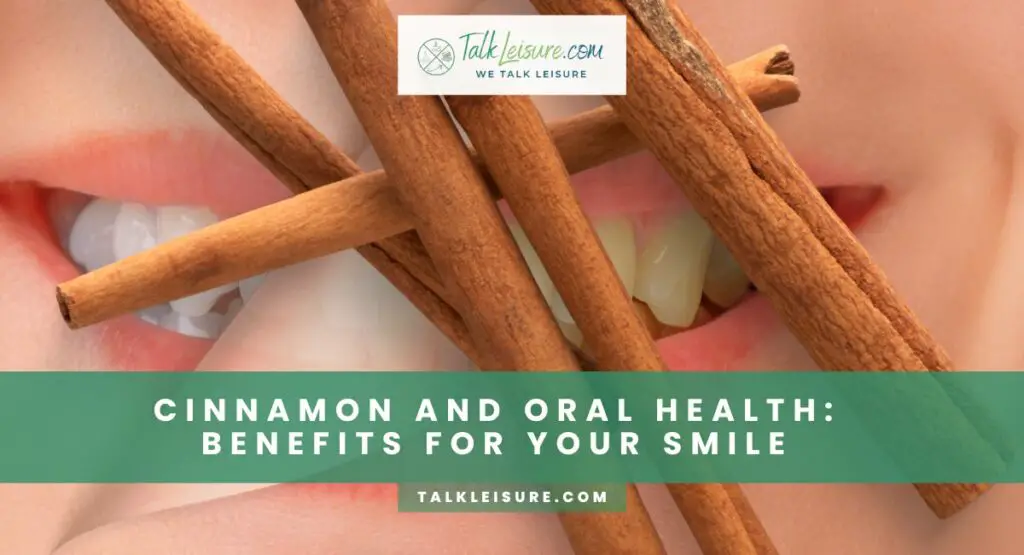A smile is one of the most beautiful and mighty things a person can possess.
It can make people feel good, boost your confidence, and create lasting impressions.
That’s why it’s essential to take care of your oral health, and one natural ingredient that can help you achieve a brighter, healthier smile is cinnamon.
Cinnamon helps maintain better oral health and supports keeping your gums healthy. Also, there are some effects of curing toothache.
Cinnamon is a popular spice known for its unique aroma and flavor.
But did you know that it also provides a range of benefits for your oral health?
From fighting off gum disease to relieving toothaches, this spice has been used for centuries as a natural remedy for various dental problems.
In this article, we’ll explore the benefits of cinnamon for your smile and how to incorporate it into your daily routine.
Does Cinnamon Affect Your Dental Health?

Cinnamon has been used for centuries as a natural remedy for various dental problems. But the question remains: does it affect your dental health?
The answer is yes! Cinnamon has antimicrobial and anti-inflammatory properties that can help reduce plaque buildup and fight off bad breath.
It’s also been effective in promoting healthy gums and preventing gingivitis.
However, it’s important to note that cinnamon should not be used as a substitute for regular dental hygiene practices such as brushing and flossing.
Cinnamon can also have potential side effects, such as mouth irritation and allergic reactions.
So, it’s best to consult your dentist before using cinnamon to supplement your oral care routine.
Use Of Cinnamon In Oral Health
Cinnamon has gained popularity for its various health benefits, including its use in promoting oral hygiene.
Cinnamaldehyde, the primary compound found in cinnamon, has antimicrobial and anti-inflammatory properties that can help fight off bad breath and promote healthy gums.
Its use can also help reduce plaque buildup and prevent the onset of gingivitis.
One way to incorporate cinnamon into your oral care routine is adding a few drops of cinnamon oil to your toothpaste or mouthwash.
It is important to note that while cinnamon can help maintain oral hygiene, it is not a substitute for regular dental hygiene practices such as brushing and flossing.
It is best to consult your dentist before adding cinnamon to your oral care routine to ensure it is safe and effective.
Applying Cinnamon To Your Oral Care Routine

Now that you understand the health benefits of cinnamon for oral hygiene let’s explore how to incorporate it into your daily routine.
One way to use cinnamon is by adding a few drops of cinnamon oil to your toothbrush before brushing.
Alternatively, mix a small amount of ground cinnamon with water to form a paste and apply it directly to your gums for a few minutes before rinsing it off.
Another effective way to use cinnamon is by incorporating it into your mouthwash.
Simply add a few drops of cinnamon oil to your mouthwash and swish it around your mouth for a few minutes before spitting it out.
Daily Routine To Incorporate Cinnamon For Better Oral Health
Cinnamon has antimicrobial properties that can contribute to oral health. Here’s a daily routine that incorporates cinnamon for oral care:
Morning Routine:
- Oil Pulling with Cinnamon-infused Coconut Oil:
- Start your day by oil pulling. Take a tablespoon of coconut oil infused with a few drops of cinnamon essential oil.
- Swish it around in your mouth for 15-20 minutes.
- Spit the oil into a trash can (not the sink, as it may solidify and clog pipes).
- Rinse your mouth with warm water.
- Cinnamon Toothpaste:
- Use a toothpaste containing cinnamon, or mix baking soda with a few drops of essential oil.
- Brush your teeth thoroughly for at least two minutes.
- Pay attention to your tongue and gums as well.
- Cinnamon Mouthwash:
- Rinse your mouth with homemade cinnamon mouthwash.
- Mix warm water with a pinch of salt and a few drops of cinnamon essential oil.
- Gargle for 30 seconds and then spit out.
Afternoon Routine:
- Cinnamon-infused Tea:
- Enjoy a cup of cinnamon tea in the afternoon.
- Cinnamon can help combat bacteria in the mouth and promote fresh breath.
Evening Routine:
- Cinnamon Dental Floss:
- Use dental floss infused with cinnamon essential oil.
- Flossing helps remove plaque and debris between teeth.
- Cinnamon Antiseptic Mouth Rinse:
- Before bed, rinse your mouth with an antiseptic mouthwash that contains cinnamon.
- Alternatively, you can simply rinse by adding a few drops of cinnamon essential oil to warm water.
- Cinnamon-infused Toothpick or Gum:
- Chew on a cinnamon-infused toothpick or sugar-free gum containing cinnamon.
- This can stimulate saliva production, helping to wash away bacteria.
General Tips:
- Stay Hydrated:
- Drink plenty of water throughout the day to maintain a moist environment in your mouth, which helps prevent bacterial growth.
- Limit Sugar Intake:
- Reduce the consumption of sugary foods and beverages, as they can contribute to tooth decay.
- Regular Dental Check-ups:
- Schedule regular dental check-ups and cleanings to ensure overall oral health.
Remember to be consistent with these habits; if you have specific oral health concerns, it’s always a good idea to consult a dentist for personalized advice.
What Substances in Cinnamon Help In Your Oral Health?

| Substance | Potential Oral Health Benefits |
|---|---|
| Cinnamaldehyde | Antibacterial properties that may help fight oral bacteria and reduce bad breath. |
| Eugenol | It possesses antioxidant properties that may help protect oral tissues from oxidative damage. |
| Polyphenols | It has anti-inflammatory effects, potentially reducing inflammation in the oral cavity. |
| Cinnamic acid | It have anti-inflammatory effects, potentially reducing inflammation in the oral cavity. |
| Calcium and Fiber | Cinnamon contains small amounts of calcium and fiber, which can contribute to overall oral health. Calcium is essential for tooth strength, and fiber can help in maintaining gum health. |
| Volatile oils | These oils may have antimicrobial properties, helping to combat bacteria in the mouth. |
Cinnamon has been a go-to spice for its pleasant aroma and flavor, but it is also beneficial for oral health.
Cinnamon contains antifungal, antibacterial, and antimicrobial properties, which can help in preventing decay and infections.
Cinnamaldehyde, a chemical that gives it its distinct flavor, is found in cinnamon, and studies have shown that it can reduce inflammation and fight bacteria in the oral cavity.
Another substance in cinnamon called eugenol is a natural anesthetic that can relieve toothaches and pains.
Furthermore, cinnamon enhances blood circulation, which can promote gum health and help prevent gum diseases like gingivitis.
Nutritional Composition Of Cinnamon

The nutritional composition of cinnamon can vary depending on the type and form of cinnamon (Ceylon or Cassia) and whether it’s in powder or stick form.
Here’s an approximate nutritional breakdown for ground cinnamon (per 100 grams):
| Nutrient | Amount |
|---|---|
| Calories | 247 kcal |
| Water | 10.6 g |
| Protein | 3.99 g |
| Carbohydrates | 80.6 g |
| – Dietary Fiber | 53.1 g |
| – Sugars | 2.17 g |
| Fat | 1.2 g |
| – Saturated Fat | 0.3 g |
| – Monounsaturated Fat | 0.2 g |
| – Polyunsaturated Fat | 0.1 g |
| Vitamins | |
| – Vitamin A | 15 IU |
| – Vitamin C | 3.8 mg |
| – Vitamin E | 2.3 mg |
| – Vitamin K | 3.3 µg |
| – Vitamin B6 | 0.1 mg |
| Minerals | |
| – Calcium | 1002 mg |
| – Iron | 8.3 mg |
| – Magnesium | 60 mg |
| – Phosphorus | 64 mg |
| – Potassium | 431 mg |
| – Sodium | 26 mg |
| – Zinc | 1.8 mg |
| – Copper | 0.3 mg |
| – Manganese | 17.5 mg |
| – Selenium | 3.3 µg |
Cinnamon is a flavorful spice and has a high nutritional and medicinal value.
It contains various essential nutrients, including vitamins, minerals, and antioxidants, crucial in maintaining overall health.
Cinnamon is an excellent manganese, iron, calcium, and fiber source, making it an ideal dietary supplement.
According to research, cinnamon can also help regulate blood sugar levels and may improve cholesterol levels.
Further, the spice is known for its anti-inflammatory properties.
It has been used in traditional medicine for centuries to treat various ailments.
Incorporating cinnamon into your diet can benefit your health, but it is crucial to consume it in moderation. Too much cinnamon can cause adverse side effects like liver damage.
Therefore, it’s advisable to consult a healthcare professional before relying on cinnamon for medicinal purposes.
Is Cinnamon Toothpaste Good For You?

Cinnamon toothpaste is a natural alternative to traditional toothpaste options.
It contains cinnamon essential oil, which has antibacterial properties and is vital in dental hygiene products.
These properties help fight bacteria that cause bad breath and gum disease. Its anti-inflammatory capabilities help to reduce swelling and pain in the gums.
Using cinnamon toothpaste is a great way to harness the benefits of this spice for your oral health.
However, it should be noted that cinnamon can be abrasive and may cause enamel erosion if used in high concentrations or for prolonged periods.
Therefore, it is essential to use cinnamon toothpaste in moderation and supplementing it with traditional dental hygiene practices, like flossing and routine dental check-ups.
Consult your dentist to determine whether cinnamon toothpaste suits your oral health needs.
Toothpaste Brands With Cinnamon
Many toothpaste brands now offer cinnamon flavor options due to their oral health benefits.
Some popular cinnamon toothpaste brands include Crest Cinnamon Rush, Colgate Cinnamint, and Tom’s of Maine Cinnamint.
Crest Cinnamon Rush toothpaste is a favorite among consumers for its refreshing and stimulating cinnamon flavor and its effectiveness in combating bad breath.
Colgate Cinnamint toothpaste, on the other hand, features a combination of cinnamon and mint flavors to deliver a fresh, long-lasting experience.
Tom’s of Maine Cinnamint offers a natural option free of artificial ingredients and fluoride. It also features a mild cinnamon taste and is ideal for sensitive teeth and gums.
When choosing a cinnamon toothpaste, always ensure it contains natural cinnamon essential oils and has no harmful chemicals that could damage your teeth and gums.
Additionally, brushing gently and avoiding overusing the toothpaste is essential to prevent enamel erosion.
How does Cinnamon Help for Gums?

Cinnamon has natural anti-inflammatory and antibacterial properties that benefit oral health, particularly for gum care.
When cinnamon is ingested or applied topically to the gums, it can help reduce swelling and inflammation by improving blood circulation and promoting healing.
Cinnamon can also help fight bacteria accumulating in the mouth, leading to gum disease and other oral health issues.
Adding cinnamon to your daily oral care routine can help promote healthier gums and prevent gum disease.
One way to use cinnamon for gum health is by adding a drop or two of cinnamon essential oil to a cup of warm water and rinsing your mouth with the solution once or twice a day.
It’s important to note that while cinnamon can benefit oral health, it is not a substitute for regular brushing, flossing, and dental visits.
Does it work for gingivitis?
Gingivitis is a common gum disease caused by bacterial buildup in the mouth.
The good news is that cinnamon can effectively combat this issue.
Cinnamon is natural and has anti-inflammatory and antibacterial properties, making it an excellent remedy for gingivitis.
Cinnamon can help reduce swelling and inflammation in the gums by improving blood circulation and promoting healing.
Furthermore, cinnamon can fight the bacteria that cause gum disease.
Adding cinnamon to your daily oral care routine by using cinnamon essential oil or chewing on cinnamon sticks can help promote healthier gums and prevent gingivitis.
However, it’s crucial to note that while cinnamon can benefit oral health, it is not a substitute for regular dental visits and proper oral hygiene.
Does Cinnamon Help Treat Toothaches?

Toothaches can be excruciating, causing immense pain and discomfort.
Luckily, cinnamon is a natural remedy that can help alleviate toothache symptoms.
Cinnamon has anti-inflammatory and pain-relieving properties that can soothe inflamed gums and reduce tooth pain.
You can make a cinnamon paste by mixing cinnamon powder with water and applying it directly to the affected area.
Another way to use cinnamon for toothaches is to chew on cinnamon sticks.
The warmth and spicy flavor of cinnamon have a numbing effect on the affected area, providing temporary relief from toothache pain.
However, seeking professional dental care as soon as possible is crucial if the toothache persists.
Cinnamon can offer short-term relief but is no substitute for proper dental treatment and oral hygiene practices.
How To Use Cinnamon On Teeth And Gums?
Cinnamon is a natural remedy that can benefit oral health in numerous ways. Here’s how you can use cinnamon on your teeth and gums:
Cinnamon Powder:
Mix cinnamon powder with water to create a paste, and apply it directly to your teeth and gums. This mixture can help combat bad breath, reduce inflammation, and fight against harmful bacteria in your mouth.
Cinnamon Oil:
Add a few drops of cinnamon oil to your toothpaste or mouthwash. This can help boost your oral care routine, as cinnamon oil has antibacterial and anti-inflammatory properties.
Cinnamon Sticks:
Chew on cinnamon sticks to freshen your breath, stimulate saliva production, and promote healthy teeth and gums.
While cinnamon can offer many benefits for oral health, it’s essential to use it in moderation.
Overuse can irritate and potentially harm your teeth and gums. Always consult with your dentist before incorporating cinnamon into your oral care routine.
How Do You Incorporate Cinnamon Into Your Daily Routine?
Cinnamon is a versatile spice with benefits beyond just oral health. You can easily incorporate cinnamon into your daily routine with these simple tips.
Add it to your morning coffee or tea: Sprinkle a little ground cinnamon for added flavor and health benefits.
Use it in your cooking: Cinnamon pairs well with sweet and savory dishes. Use it in baking recipes, sprinkle it on roasted vegetables, or add it to savory soups.
Make cinnamon water: Boil cinnamon sticks in water for 10-15 minutes, then strain and drink the infused water. This is a great way to get the health benefits of cinnamon without the added sugar of cinnamon-flavored drinks.
Always use cinnamon in moderation and consult your doctor before adding it to your daily routine, especially if you have any underlying health conditions.
Health Benefits of Cinnamon

Cinnamon is a spice with various health benefits used for centuries in traditional medicine.
Not only does it add flavor to your food and drink, but it also contains powerful antioxidants that can promote overall well-being.
Here are some potential health benefits of cinnamon:
Antioxidant Properties: Cinnamon is rich in antioxidants, which help to protect the body from oxidative stress caused by free radicals. Antioxidants are believed to play a role in preventing chronic diseases and aging.
Anti-Inflammatory Effects: Cinnamon has anti-inflammatory properties that may help reduce inflammation. Chronic inflammation is linked to various health conditions, including heart disease and certain cancers.
Blood Sugar Control: Some studies suggest that cinnamon may help improve insulin sensitivity and lower blood sugar levels, potentially benefiting people with insulin resistance or type 2 diabetes. However, more research is needed to confirm these effects.
Heart Health: Cinnamon may positively affect heart health by reducing risk factors such as high cholesterol and triglyceride levels. It may also help lower blood pressure, although more research is needed to establish these effects conclusively.
Antimicrobial Properties: Cinnamon has natural antimicrobial properties that may help fight bacteria and fungi. It has been used traditionally for its ability to inhibit the growth of certain bacteria and may contribute to oral health.
Neuroprotective Effects: Some animal studies suggest that compounds in cinnamon may have neuroprotective properties, potentially offering benefits for brain health. More research is needed to understand these effects in humans.
Incorporating cinnamon into your daily routine is an easy and delicious way to boost your health and wellbeing.
The Potential Side Effects Of Cinnamon In Oral Health
While cinnamon has several health benefits, it’s important to note that it can also have some potential side effects.
One of these side effects is that it can cause irritation or allergic reactions in some people.
Additionally, consuming too much cinnamon can cause burning sensations in the mouth or throat, which can be uncomfortable.
Oil, in particular, can be harmful if ingested in large quantities, as it can cause mouth sores and other complications.
It’s also important to note that cinnamon can stain teeth if used excessively, especially in cinnamon-flavored gum or candy.
To avoid these potential side effects, using cinnamon in moderation and complementing oral hygiene practices such as brushing and flossing regularly is best.
It’s also essential to consult with your dentist or healthcare provider if you have any concerns or allergies regarding using cinnamon in your oral health routine.
Final Thoughts
In summary, cinnamon is more than just a tasty spice; it can be a friend to your oral health.
Using cinnamon-infused products like toothpaste or mouthwash, or even incorporating cinnamon sticks into your routine, may help fight off bad breath, reduce inflammation, and combat bacteria in your mouth.
While cinnamon offers these benefits, it’s crucial to remember that it’s not a substitute for regular brushing, flossing, and dental check-ups.
Also, be mindful of potential side effects like mouth irritation or allergies, and consult your dentist before making cinnamon a regular part of your oral care routine.
So, enjoy the natural goodness of cinnamon for a brighter, healthier smile!
FAQ
Why Brush Your Teeth Your Cinnamon?
Brushing your teeth with cinnamon can help fight bad breath, prevent tooth decay, and promote healthy gums.
Cinnamon contains compounds that possess antimicrobial properties, which can inhibit the growth of bacteria in the mouth.
This, in turn, helps to prevent cavities and gum disease caused by harmful bacteria in the mouth. Additionally, the pleasant smell and taste of cinnamon can also help freshen breath naturally.
How Do You Use Cinnamon Sticks For Toothache?
To use cinnamon sticks for toothache, you can steep them in hot water for several minutes, cool the solution, and swish them around your mouth for a couple of minutes.
You can also place a cinnamon stick on the affected area and let it rest to ease the discomfort.
However, it is essential to note that cinnamon sticks can only provide temporary relief, and visiting a dentist for proper treatment is necessary to maintain oral health in the long run.
Does Cinnamon Stain Teeth?
Many people assume that consuming cinnamon can lead to teeth staining, but this is not entirely accurate. While some spices can stain teeth, cinnamon is not one of them. Cinnamon has several oral health benefits that help keep your teeth and gums healthy.
Best Wishes!












